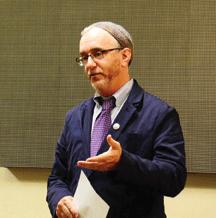
Rabbi Moti Rieber is among the fortunate ones who find their work meaningful beyond just making a living.
Rabbi Rieber has been executive director of Kansas Interfaith Action (KIA) and its predecessor organization, Kansas Interfaith Power & Light, since March 2011.
KIA is described on its website as a “statewide, multifaith, issue-advocacy organization that addresses and advances public policies consistent with the values of our various faith traditions” and that puts “faith into action by educating and engaging people of faith and the public regarding critical social, economic and environmental justice issues.”
“I’ve been an activist all my life,” Rabbi Rieber said. “I take very seriously the Jewish tradition of tikkun olam — to repair the world. Inspired by this and by Dr. King’s message of social justice, I got myself in a position where I was able to contribute to positive social change. Working among faith communities to bring people together for common purpose in the expression of our common values — I find that very gratifying to be able to do that kind of work.”
Others have recognized the value of his work, as well. He and KIA each received an award last year: one for himself in August from the Crescent Peace Society, a local, Muslim civic-advocacy group; and another for KIA from the Council on American-Islamic Relations’ Kansas chapter, as most valuable partner.
KIA has prioritized supporting Kansas Muslims as an important part of its mission, Rabbi Rieber said, “because the vilification of American Muslims by certain parts of the political world is nothing short of immoral, as far as I’m concerned.”
“They are upstanding people, but the kinds of things being said about Muslims now are pretty much the same things said about Jews 100 years ago, (including that) they won’t assimilate into our society. As a Jew, with a history of persecution, it’s important to me to stand with American Muslims against those who would either harm them or abuse them.”
Rabbi Rieber was born in New York and raised in New Jersey. He was ordained by the Reconstructionist Rabbinical College in Wyncote, Pennsylvania.
He came to Kansas in 2007 and to the Kansas City area, where his wife, Suzy, is originally from, in 2010. They live in Overland Park with their three children.
Rabbi Rieber describes his work with KIA as social justice organizing. He speaks to congregations throughout the state and creates programming directed to “people of faith and conscience around policy issues.” He’s also a registered lobbyist and spends considerable time in the Kansas Legislature in Topeka, advocating for legislative change.
He is KIA’s sole staff member, though he sometimes takes on interns. A nine-member board comprising people from around the state and of differing religions oversees the organization. He describes KIA and himself as progressive politically.
“In Kansas, electoral politics is either conservative or moderate, for the most part,” he said. “But we’re trying to push the conversation, especially within faith communities, in a progressive direction.”
KIA’s work focuses on combatting racism and discrimination; promoting economic justice; preserving access to the social safety net and the fair treatment of workers; opposing violence, particularly gun violence; and working to reverse climate disruption.
KIA also models its work on that of Rev. William Barber in North Carolina — “fusion politics,” Rabbi Rieber said — which strives to “form a coalition of people with varied interests to work in concert for meaningful change.”
KIA is focusing mainly on five issues in the Kansas Legislature’s current session: voter rights and voter suppression; expanding Medicaid; criminal justice reform; funding for and access to anti-poverty programs; and immigrants’ rights.
“Kansas has the most restrictive access to voting of any state in the country,” he said. “The (American Civil Liberties Union) of Kansas has the Kansas Coalition for Civic Participation, and we’re part of that,” he said. “The main thing it does is rolling back the birth certificate requirement for voter registration. There’s no evidence that people who aren’t citizens are trying to vote. You need ID for a lot of things, but relying on driver’s licenses is problematic. Proof-of-citizenship requirements have a suppressive effect.”
Criminal justice reform includes increased use of diversion from the prison system, which prosecutors underutilize, he said, especially with drug violations; and civil asset forfeiture (“If the police think your possessions you have on you were gotten in the commission of a crime, they can take them in Kansas,” he said), adding that the practice is disproportionately used against people of color.
KIA supports the Development, Relief and Education for Alien Minors Act (DREAM Act), “and we oppose breaking up immigrants’ families,” Rabbi Rieber said.
“We feel that immigration and diversity is a strength in America, not a weakness,” he said. “We ask our federal and state and local officials to leave immigrants alone, essentially.”
Some members within the same immigrant families in the United States have legal status and others have illegal status, he said, and “deporting them can be extremely disruptive and doesn’t take into account how they’re contributing.”
Much of Rabbi Rieber’s outlook on key issues involves clearly distinguishing between privileges and rights.
“I believe that in the richest country in the world, no one should be deprived of food or shelter or access to medical care based on whether they can afford it or not,” he said. “We believe as people of faith that these are human rights.”



